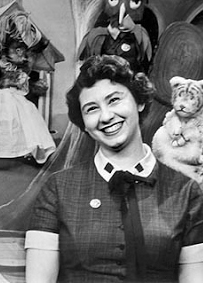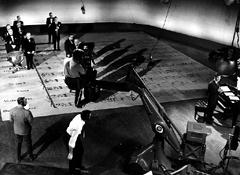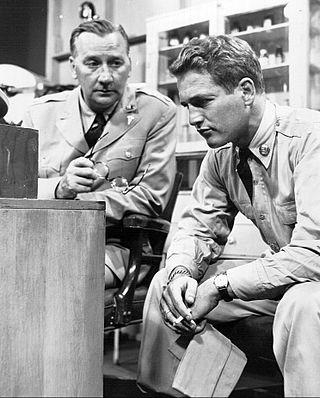Related Research Articles

The George Foster Peabody Awards program, named for the American businessman and philanthropist George Peabody, honor what are described as the most powerful, enlightening, and invigorating stories in all of television, radio, and online media. Because of their academic affiliation and reputation for discernment, the awards are held in high esteem within the media industry.
The year 1958 in television involved some significant events. Below is a list of television-related events during 1958.

John Charles Patrick Croghan Daly was an American journalist, host, CBS radio and television personality, ABC News executive, TV anchor, and game show host, best known for his work on the CBS panel game show What's My Line?

Josephine Vicari Massucci Franz, known by the stage name Josie Carey, was a lyricist and a host of several children's television shows.

Kukla, Fran and Ollie was an early American television show using puppets. It was created for children, but was soon watched by more adults than children. It did not have a script and was entirely ad-libbed. It was broadcast from Chicago between October 13, 1947, and August 30, 1957. Comedienne Fran Allison starred, interacting with puppets, Kukla and Ollie whose puppeteer was the show's creator, Burr Tillstrom. After the original run, the team appeared in other productions over several decades.
Loring Mandel was an American playwright and screenwriter whose notable works include the television film Conspiracy. He wrote for radio, television, film and the stage.
The Electric Grandmother is a television movie that originally aired January 17, 1982, on NBC as a 60-minute Project Peacock special, based on the 1969 science fiction short story "I Sing the Body Electric" by Ray Bradbury. It stars Maureen Stapleton and Edward Herrmann and was directed by Noel Black. Bradbury's story was originally written as a teleplay in 1962 as "I Sing the Body Electric", an episode of The Twilight Zone. The film was distributed on VHS by Coronet Video.

Omnibus was an American, commercially sponsored, educational variety television series.

The Kaiser Aluminum Hour is a dramatic anthology television series which was broadcast in prime time in the United States from July 3, 1956, through June 18, 1957, by NBC.
Robert Wells was an American songwriter, composer, screenwriter and television producer. During his early career, he collaborated with Mel Tormé, writing several hit songs, most notably "The Christmas Song" in 1945. Later, he became a prolific writer and producer for television, for such shows as The Dinah Shore Chevy Show, as well as for numerous variety specials, such as If They Could See Me Now, starring Shirley MacLaine. He was nominated for several Academy Awards and won six Emmys and a Peabody Award.
Celanese Theatre is an anthology television series which aired from October 3, 1951, to June 25, 1952, on ABC.

Zoo Parade is an American television program broadcast from 1950 to 1957 that featured animals from the Lincoln Park Zoo in Chicago. Presented by Marlin Perkins, the show was broadcast on Sunday afternoons on NBC.
The Sylvania Awards were given by the television manufacturer Sylvania Electric Products for various categories of television performance, broadcasting, scripts, music and other aspects of production between 1951 and 1959. In their day they rivaled the Emmy Award for prestige. They came to an end after the sponsor was merged into GTE.

"Little Moon of Alban" was an American television play broadcast by NBC on March 24, 1958, as part of the television series, Hallmark Hall of Fame. It was written by James Costigan, directed by George Schaefer, and starred Julie Harris and Christopher Plummer.
The 1952 Sylvania Television Awards were presented on December 11, 1952, at Hotel Pierre in New York City. The Sylvania Awards were established in 1951 by Sylvania Electric Products. Deems Taylor was the chairman of the judges committee.
The 1953 Sylvania Television Awards were presented on December 1, 1953, at Hotel Pierre in New York City. The Sylvania Awards were established by Sylvania Electric Products. The awards were selected by a committee of 16 judges led by Deems Taylor.
The 1954 Sylvania Television Awards were presented on November 30, 1954, in New York City. The Sylvania Awards were established by Sylvania Electric Products. The awards were selected by a committee of judges that included Ethel Barrymore, Deems Taylor, and James A. Farley.
The 1958 Sylvania Television Awards were presented on January 22, 1959, at the Plaza Hotel in New York City. The Sylvania Awards were established by Sylvania Electric Products.

The Moon and Sixpence was an American television movie broadcast on NBC on October 30, 1959. The production, starring Laurence Olivier, was adapted by S. Lee Pogostin from the novel by Somerset Maugham. The production won multiple Emmy and Sylvania Awards, including awards for Olivier's acting, Pogostin's adaptation, and Robert Mulligan's direction.
"The Turn of the Screw" was an American television movie broadcast by NBC on October 20, 1959, as the third episode of the television series, Ford Startime. It was written by James Costigan as an adaptation of Henry James' novella of the same name. John Frankenheimer was the director and producer.
References
- 1 2 "' Youth Wants to Know,' Weekly Offering on N. B. C., Sets Example for Discussion Programs". The New York Times. March 10, 1952. p. 28.
- ↑ "Youth Wants to Know". Peabody Awards. Retrieved September 25, 2020.
- ↑ "Sylvania Television Grand Award Goes to N.B.C.'s 'Victory at Sea'". The Courier-Journal (AP story). December 12, 1952. p. II-2 – via Newspapers.com.